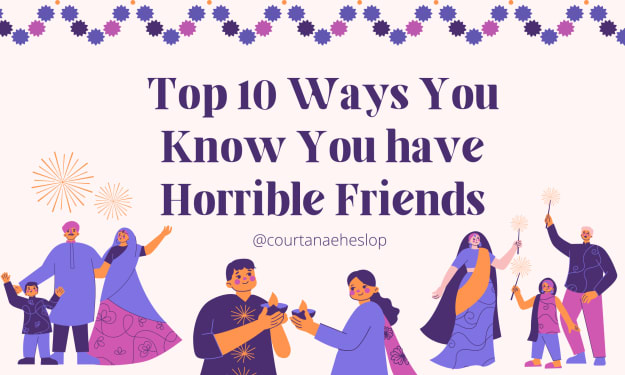Your Friend Is About To Tell You Something You DON'T Want to Hear
"The most important thing is that we keep an open mind when talking with others so that we can still have good relationships with everyone even though we have different opinions on certain topics."

The truth is, we all have to deal with some sort of criticism. But the way you say something can make or break how your friend feels about you. So here are a few ways to handle it:
Don't get defensive.
You're about to hear something from your friend that you don't want to hear. It could be an apology, a confession or admission, or just some hard news. Whatever it is, you know it's going to be hard for you.
You may already be feeling defensive, angry or upset by what has been happening lately and now this is the last thing you need. But before you get offended; try to keep an open mind because everything said in those moments is not always coming from a place of malice or ill intent. They could just be trying to tell their side of things and why they did what they did!
Instead of getting defensive and making excuses for yourself (or worse yet - making excuses for them), try being compassionate towards your friend AND yourself at the same time!
It's okay to disagree.
This one is easy. It's okay to disagree.
In fact, you should want to disagree with your friend. If they're telling you something you don't want to hear and they expect you not to say "I disagree," that means they don't trust your opinion or value what you have to say - and if that's true, then why would they bother telling you anything in the first place? This person is not a good friend if she doesn't respect her friends' opinions or ideas.
Don't make it all about you.
- Don't make it all about you. When we're having a hard time accepting a friend's perspective, it can be tempting to turn the conversation around and make it all about us: "But I'm worried about you! What if you get sick? What if this hurts your health?" It's okay to disagree with someone, but sometimes that disagreement can fall into an unhealthy pattern in which their side of the argument is just as important as yours. Remind yourself that there's nothing wrong with feeling strongly about a topic - but remember that you can't change someone else's mind (or force them out of their house).
- Listen well. You might think that listening attentively will help convince your friend not to quit her job, but research shows otherwise: People who feel listened to are more likely to stick with decisions they've made after asking advice from friends or family members. This doesn't mean you need listen silently while your friend rambles on; instead, show genuine interest by nodding and using eye contact when appropriate - but don't interrupt unless she asks for suggestions or input from her audience (or if either of those things sound like fun).
Remember that you can't change the other person's mind.
There's no surer way to lose an argument than by trying to change someone else's mind. It's okay if you don't agree with them, but don't waste your energy convincing them of something they're not going to believe in the first place. Instead, focus on changing your own belief system and attitude as necessary so that you can get over it more quickly.
Don't take it personally.
It's easy to get defensive or feel threatened when someone criticizes you or says something that isn't flattering. But, in most cases, it's not personal - it's just a statement of fact. And if you take it personally and let it bother you (or worse yet, react with anger), then you're missing out on an opportunity for growth.
So next time your friend tells you something about yourself that's hard to hear (and there will be a next time!) remember: Don't take it personally!
Don't put the person on the spot.
As a friend, you want to be there for your pal. But sometimes when you're desperate to help someone, you may unintentionally do something that makes the situation worse.
Here are some tips for how not to make the person feel defensive or judged:
- Don't put them on the spot. It's bad enough that they're trying to tell you something difficult; don't make them feel like they have no escape route by asking questions like: "So what did he do? Was he cheating on you?" or "Did she really cheat on you?" These kinds of questions will only pressure your friend into getting defensive and/or feeling like they need to defend themselves against being accused of making poor decisions (which is often not at all what is happening). Instead, try listening first (as hard as it might be), then ask open-ended questions about why this happened in order for both parties involved. The bottom line here is don't put people in a position where they feel like their partner betrayed them - it's going to make them defensive and upset!
Don't be afraid to hear something no one likes to hear!
It's important to remember that you can't change the other person's mind. If they're set on their opinion, they aren't going to change it just because you think otherwise. You also can't control what a person thinks, so don't waste your time trying to figure out why someone has an opinion that differs from yours.
It's okay to disagree with people! It doesn't mean things will go badly between you and the person who disagrees with your views - in fact, it might be a good way for both of you learn something new about each other. Just remember: even when discussing touchy topics like politics or religion (which are perfect examples of topics where many people have strong opinions), it's important not put anyone on the spot by asking them questions like "do you agree?" or "isn't this true?" The answer isn't always clear-cut or simple - and it certainly isn't something worth getting upset about!
Conclusion
It's okay to disagree with someone, but it doesn't mean you're necessarily wrong. Everyone has their own point of view and it can be hard for them to see where you're coming from. But it's also important not to make this about yourself or your feelings because then you won't be able to hear what they are saying! Ultimately, the most important thing is that we keep an open mind when talking with others so that we can still have good relationships with everyone even though we have different opinions on certain topics.
About the Creator
Courtanae Heslop
Courtanae Heslop is a multi-genre writer and business owner.






Comments
There are no comments for this story
Be the first to respond and start the conversation.